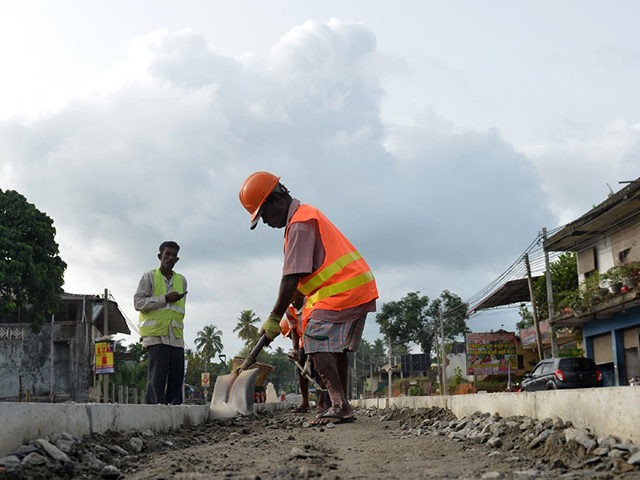The Chinese coronavirus has caused a global economic crisis creating an opportunity for Beijing’s Belt and Road Initiative (BRI) to emerge as the “best hope” to facilitate recovery, a South China Morning Post (SCMP) op-ed argued Wednesday.
The op-ed was written by Mukhtar Hussain, the head of Belt and Road Initiative and Business Corridors, Asia-Pacific, at HSBC, a multinational investment bank and financial services holding company headquartered in London and focused on Asia. Through its Belt and Road Initiative (BRI), Beijing establishes economic partnerships with developing countries across the globe in an effort to expand the Chinese Communist Party’s (CCP) geopolitical influence and power. The BRI offers predatory loans to developing nations, giving China the opportunity to indebt the country and seize its properties when it can no longer pay.
“The Covid-19 [Chinese coronavirus] pandemic has caused a crisis for every economy. At the same time, it has also created an opportunity for the Belt and Road Initiative to prove its value as an international partnership that serves the international good,” Hussain wrote. “There can be no global recovery, especially for developing countries, without a recovery in the cross-border flow of capital, goods, and services.”
“As a cosmopolitan, high quality, and sustainable network for investment and trade flows, the Belt and Road Initiative can make a vital contribution to the global recovery. For capital-constrained emerging economies, it may be the best hope for a swift revival,” Hussain claimed. “I have seen for myself how investment under the plan’s umbrella, whether in ports or auto manufacturing, can help a local economy connect with international markets, boost businesses, and generate jobs.”
The author’s choice to highlight BRI port projects as an example of the initiative’s success seems surprising, given that two BRI-member nations, Greece and Sri Lanka, were forced to cede control of their ports to Bejing in recent years due to debt constraints.
In 2017, Sri Lanka was compelled to give China “a controlling equity stake” in its Hambantota Port and “a 99-year lease for operating it” after the South Asian island defaulted on BRI loans to Beijing, which it had relied on to finance the port’s development. As the Center for Strategic and International Studies (CSIS) noted, on the day the port was handed over, China’s state-run Xinhua news agency triumphantly tweeted: “Another milestone along path [sic] of #BeltandRoad.”
Another milestone along path of #BeltandRoad. Sri Lanka officially hands over southern port of Hambantota to China on 99-year lease pic.twitter.com/EOpjYn9IZH
— China Xinhua News (@XHNews) December 10, 2017
International observers decried the move as a serious threat to Sri Lanka’s sovereignty, which Beijing had already begun to undermine prior to the official deal as it drew closer to the island country through its BRI. According to CSIS, “a Chinese submarine docked at Colombo, Sri Lanka’s capital,” in 2014 “setting off alarms about China’s expanding military footprint” in the South Asia region.
In 2016, Greece sold 51 percent of its strategic Piraeus Port to Cosco, a Chinese state-owned shipping giant. The deal also gave Bejing 100 percent of Piraeus’s container terminal “for a bargain price of 368.5 million euros, plus 760 million euros in upgrades and revenue sharing. Piraeus became Chinese-owned, effectively in perpetuity,” Fortune noted.
“Piraeus has become … an object lesson in the ways China’s biggest companies both execute and benefit from the BRI. The port has been majority-owned since 2016 (and operated since 2009) by China Cosco Shipping — a state-owned giant established nearly 60 years ago by Communist founding father Mao Zedong,” according to Fortune.
Cosco typically “signs long-term concessions with local governments; Piraeus is the only European port where it owns outright a controlling stake.”
A strategic Mediterranean port since ancient times, Piraeus today remains “the closest major container terminal on the European mainland for ships emerging from the Suez Canal—and a gateway to a huge swath of southeastern Europe,” according to the report. In 2018, Piraeus ranked as Europe’s sixth-largest cargo port.
As in Sri Lanka, Chinese naval vessels docked at Piraeus in July 2017 and “rais[ed] hackles at NATO, of which Greece is a member,” Fortune recalled.
“When Westerners think about competition with China, the conversation often involves advanced technology — think artificial intelligence or 5G Internet,” the American business magazine noted. “But the BRI underscores the importance of the infrastructure of trade itself: railways, roads, harbors. Ports may be the most vital link in that network. Roughly 90 percent of goods traded internationally makes its way around the world by sea. Control the shipping lanes and ports, and you wield great power over the global economy.”
In an exclusive interview in May, Breitbart News’s Matt Boyle asked U.S Secretary of State Mike Pompeo about Beijing’s BRI and how the CCP uses the initiative to build “control of shipping lane[s] … all around the world” in its “geopolitical quest for control and dominance.”
The BRI represents the CCP’s “efforts to create control and influence around the world,” Pompeo said in agreement. “China’s efforts to use their wealth, state-owned enterprises, and their authoritarian regime … in the straits, the sea lanes all around the world, present real risk to the United States of America and to free nations,” he added.

COMMENTS
Please let us know if you're having issues with commenting.